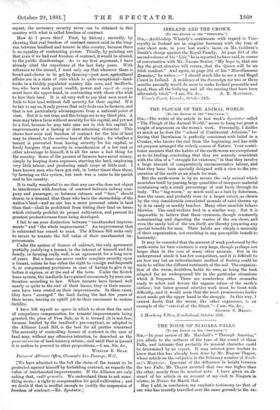THE PLOUGH OF THE ANIMAL WORLD.
[To THE EDITOR OF THE "SPECTATOR?']
SIR,—The writer of the article in last week's Spectator called "The Plough of the Animal World," seems to hang too great a
weight of argument on the worm's work. Personally, I dislike as much as he does the "school of Continental Atheism," be- lieving that Darwinism is perfectly consistent with belief in a Creator, who knows the end from the beginning, and has with set purpose arranged the orderly course of Nature. Your contri- butor assumes that the habits of the earth-worm are exceptional as to its feeding, concluding that they are scarcely consistent with the idea of a "struggle for existence," in that they involve a large amount of comparatively unremunerative labour, and that they have been specially designed with a view to the pre- paration of the earth as an abode for man.
But the earth-worm is by no means the only animal which nourishes itself by passing large quantities of inorganic material (containing only a small per-centage of real food) through its body. The "lug-worm," so much used as a bait by fishermen, does the same, and probably even to a larger extent, as shown by the very considerable convoluted mounds of sand thrown up by it on sandy or muddy beaches. Many other annelids behave likewise. The sand-urchins feed in a similar way. But it is impossible to believe that these creatures, though constantly comminuting and digesting the wastes of the sea-shore, and even the sandy bed of the sea itself, are thereby preparing any special benefits for men. Their habits are simply a necessity of their organisation, not resulting in any perceptible benefit to humanity.
It may be conceded that the amount of work performed by the earth-worm for bare existence is very large, though perhaps not larger than in the case of many other animals. But in its underground abode it has few competitors, and it is difficult to see how any but an indiscriminate method of feeding could be made to utilise the diffused nutriment of the soil. The organisa- tion of the worm, doubtless, holds its own, as being the best adapted for an underground life in the particular situations which it frequents. There are numberless other stomachs ready to select and devour the organic refuse of the earth's surface ; but below ground selective work must be beset with difficulty, and it would seem that the most promiscuous feeder must needs get the upper hand in the struggle. In this way, I cannot doubt that the worm, like other organisms, is an example of the "survival of the fittest."—I am, Sir, Sm.,
GEORGE S. BRADY.
2 Mowbray Villas, Sunderland, October 24th.


































 Previous page
Previous page